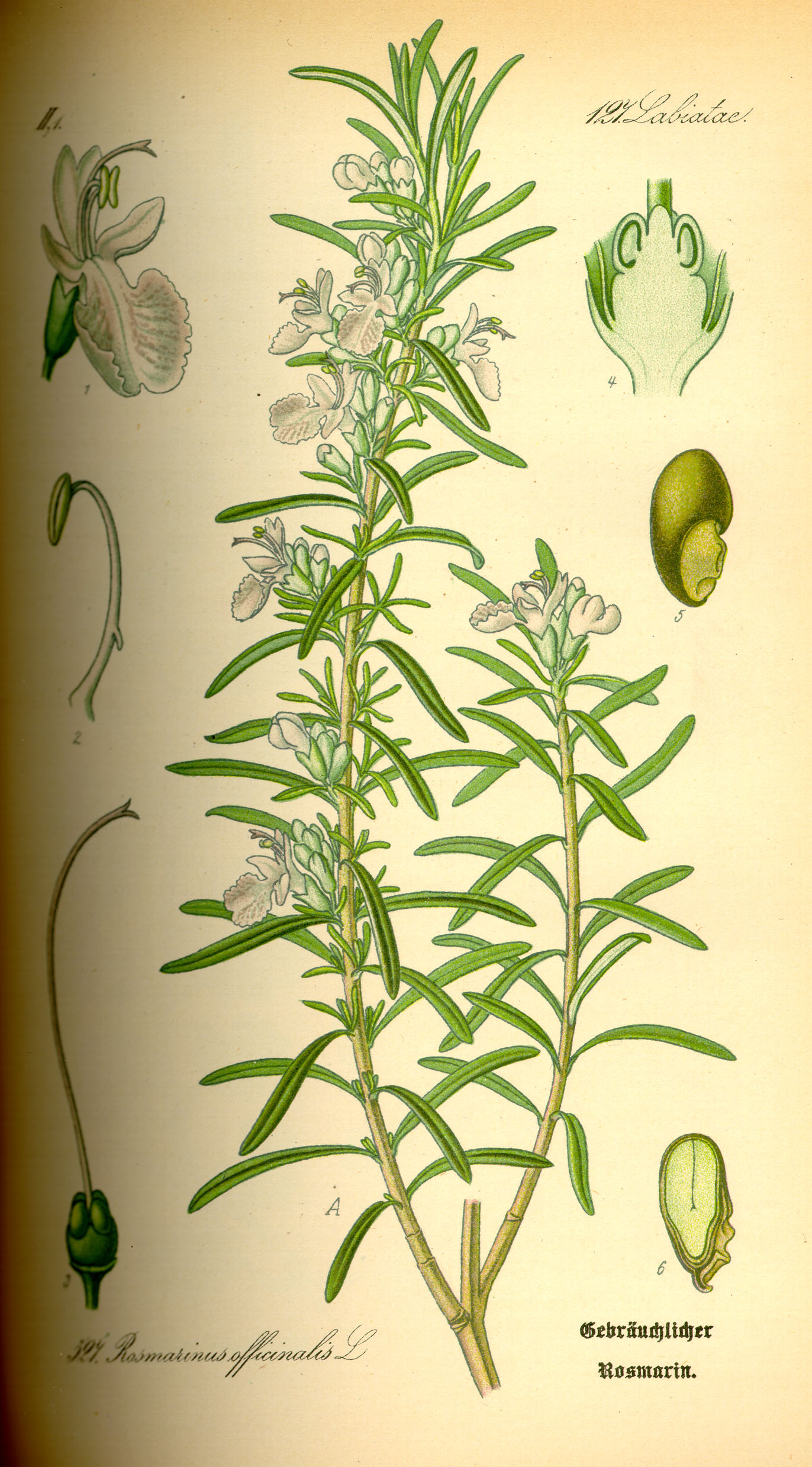The Healing Lore of Rosemary
The Latin name of this plant Rosmarinus means “dew of the sea” or “Rose of the Sea” and officinalis refers to that species use as the official variety in the British Pharmacopeia. It loves to grow near the seaside of the Mediterranean and North African lands and possibly originated there. Now it is cultivated the world over and continues to thrive in Mediterranean conditions. It is an evergreen herb with dazzling white pink, purple or blue flowers.
It is fascinating that ancient people knew things about plants that modern medicine is only beginning to study. How did they know these things without the modern clinical scientific process? Often, in our modern age we become so dependent on clinical scientific studies we forget how to use our own intuitive body wisdom to understand life. The modern scientific approach can have many benefits but I find it important to honor the fact that the studies being currently performed are inspired by these older observed and recorded uses of plant wisdom.
Throughout history we can see over and over how humans knew it to be a plant of remembrance. One old ballad proclaims:
“Rosemary is for remembrance
Between us day and night,
Wishing that I may always have
You present in my sight.”
It was and is still used at weddings and at funerals for its mystical gifts of remembrance. It was placed on Juliet’s grave for remembrance, Early Europeans commonly threw sprigs of Rosemary into graves for remembrance, Rosemary was placed in the tombs of Egypt to help them remember previous lives and today it is still used to honor the war deaths in Australia and New Zealand.
There is also a rich history of Rosemary also as a wedding plant. It is believed to offer fidelity, love, friendship and remembrance of the life the woman led before marriage when worn as a wreath upon the head. This common practice led to the Troubadours referring to Rosemary as Coronaria in their love filled ballads. French legend claims that if a man does not like the scent of Rosemary he will not make a good lover. Furthermore, the Greeks are said to have braided Rosemary into their hair before exams.
There are many other documented medicinal uses of Rosemary and its renowned memory enhancing properties. Dr. Culpepper recorded these effects of the plant "the (rosemary) water is an admirable cure-all remedy of all kinds of cold, loss of memory, headache, coma." It receives and preserves natural heat, restores body function and capabilities, even
at late age. There are not that many remedies producing that many good effects." ("Pharmacopeia Londoniensis", Nicholas Culpepper, 1653).
Now it is being studied for it’s potential to heal or soothe Alzheimer’s and dementia patients. Case Adams a ND goes into to detail about many of the modern studies performed relating to Rosemary and memory. He shares that culinary doses of Rosemary will enhance overall memory function and for therapeutic doses one study at the Tai Sophia Institute found that “750 milligram doses had the most therapeutic effect, but not higher. Higher doses had the opposite effect.”
Another study concluded:
“In conclusion, we found aromatherapy an efficacious non-pharmacological therapy for dementia. Aromatherapy may have some potential for improving cognitive function, especially in AD patients.”

This is not intended to be medical advice. Essential oils are highly potent, concentrated substance and should be used with care. For serious medical concerns, it is recommended you consult with a qualified healthcare professional whom you trust and whose core values reflect and synchronize with your own. You are also encouraged to ask plenty of questions of healthcare professionals and yourself regarding your own health care in order to be fully informed and conscious of your available options their potential risks and benefits.
Reference
Adams, ND, C. (2014, May 16). Rosemary boosts memory and fights Alzheimer’s - heal naturally. Retrieved December 8, 2016, from Health, http://www.realnatural.org/rosemary-found-to-boost-memory-may-help-prevent-alzheimers/
Incorporated, A. L. L. The history of the magical Rosemary Plant. Retrieved December 8, 2016, from http://www.adlunamlabs.com/History_of_Rosemary.html
Jimbo, D., Kimura, Y., Taniguchi, M., Inoue, M., & Urakami, K. (2010). Effect of aromatherapy on patients with Alzheimer’s disease. Psychogeriatrics : the official journal of the Japanese Psychogeriatric Society., 9(4), 173–9. Retrieved from https://www.ncbi.nlm.nih.gov/pubmed/20377818
Rosemary. (2013, March 2). Retrieved December 8, 2016, from http://www.ourherbgarden.com/herb-history/rosemary.html
Peterson, D. (1986). Aromatherapy 101 Basics of Aromatherapy
Image is from the Creative Commons for free use
Congratulations @safiyahmariposa! You have completed some achievement on Steemit and have been rewarded with new badge(s) :
Click on any badge to view your own Board of Honor on SteemitBoard.
For more information about SteemitBoard, click here
If you no longer want to receive notifications, reply to this comment with the word
STOP